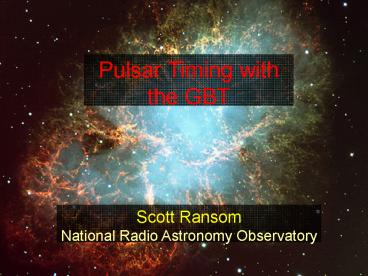Pulsar Timing with the GBT - PowerPoint PPT Presentation
Title:
Pulsar Timing with the GBT
Description:
Are many of the fastest-spinning pulsars hidden? 5 of the 10 fastest-spinning pulsars show eclipses. ... Spin Freq. (Hz) Pulsar. Name. Are the frequencies ... – PowerPoint PPT presentation
Number of Views:60
Avg rating:3.0/5.0
Title: Pulsar Timing with the GBT
1
Pulsar Timing with the GBT
Scott Ransom National Radio Astronomy Observatory
2
Why NRAO's GBT for pulsars?
100-m fully steerable telescope in West
Virginia The GBT provides Sensitivity 2-5x
more sensitive than Jodrell Bank or
Parkes (Arecibo is 3-4x better) Sky
Coverage 85 of total sky 65-75 for Parkes
and JB 33 for Arecibo National Radio-Quiet
Zone Does not provide Extremely large amounts
of dedicated pulsar time (currently 20)
3
Pulsar Timingwith the GBT
Approx 10 projects 50 millisecond
pulsars (MSPs) in clusters 12 high-precision
MSPs 5-6 interesting binaries (e.g.
J0737-3039) 1-2 young pulsars (e.g.
G21.5-0.9) 1 radio-loud magnetar 10-15 normal
PSRs
4
Pulsars in Globular Clusters
- Clusters of ancient stars (9-12 billion years
old) that orbit our galaxy - Contain 105-106 stars, many of which have binary
companions - Very high densities (100-10,000 stars/ly3) result
in stellar encounters and collisions! - They are effectively millisecond pulsar factories
(and exotic ones at that!) - Number known has more than tripled since 2000
5
(No Transcript)
6
Globular Cluster MSP Timing
- Almost all of the new pulsars are MSPs (50-716
Hz) - Approx half are isolated (this is a selection
effect) - Many exotic systems
- 10 highly eccentric (egt0.2) binaries
- 2 with main sequence companions? (Ter5ad and
Ter5P the 1st and 5th fastest MSPs known) - 7 eclipsing systems
- Timing precisions typically 20-50 µs (1 pulse
period)
Terzan 5 (32 timing solns)
7
Fastest Millisecond PulsarsAre many of the
fastest-spinning pulsars hidden?
Are the frequencies limited by gravitational
radiation?
5 of the 10 fastest-spinning pulsars show
eclipses. 5 of the 10 fastest-spinning pulsars
are found in Terzan 5
8
(No Transcript)
9
(No Transcript)
10
Pulsar Timingwith the GBT
Approx 10 projects 50 millisecond
pulsars (MSPs) in clusters 12 high-precision
MSPs 5-6 interesting binaries (e.g.
J0737-3039) 1-2 young pulsars (e.g.
G21.5-0.9) 1 radio-loud magnetar 10-15 normal
PSRs
11
High-Precision Timing A Pulsar Timing Array for
GW Detection
- Currently a large group including people from
Berkeley, UBC, NRL, Bryn Mawr, NRAO, etc... - Need 12-20 MSPs spread across the full sky
- Requires timing precisions of 100ns-1µs
10-4-10-3 in phase - Competing projects at Parkes and in Europe
- Will likely become a true international effort
within the next couple years - Long-term project (5-10 yrs)
12
Current GBT PTA Status
13
Pulsar Timingwith the GBT
Approx 10 projects 50 millisecond
pulsars (MSPs) in clusters 12 high-precision
MSPs 5-6 interesting binaries (e.g.
J0737-3039) 1-2 young pulsars (e.g.
G21.5-0.9) 1 radio-loud magnetar 10-15 normal
PSRs
14
The Double-Pulsar Binary J0737-3039
- This system has two visible pulsars and is
currently being studied primarily with the GBT.
At least 5 tests of General Relativity have
already been made, to a precision of better than
0.05!
From Kramer et al., 2005, astro-ph/0503386
15
Pulsar Timingwith the GBT
Approx 10 projects 50 millisecond
pulsars (MSPs) in clusters 12 high-precision
MSPs 5-6 interesting binaries (e.g.
J0737-3039) 1-2 young pulsars (e.g.
G21.5-0.9) 1 radio-loud magnetar 10-15 normal
PSRs
16
Young Pulsar in G21.5-0.9
- PSR J1833-1034
- 61.8ms, likely lt1000 yo
- Very weak 70 µJy
- (Camilo et al 2005)
2nd highest Edot in galaxy (3x1037 ergs/s) Very
stable timing for a such a young PSR More likely
due to GLAST
17
Outlook for the future...
- Prospects for new discoveries with the GBT are
good - Many more clusters to observe and search
- Upcoming all-sky surveys (many more MSPs)
- We really want more Holy Grails
- MSP-MSP binary
- PSR-BH binary
- sub-MSP
- Longer term, an Arecibo in the South would find
and time hundreds of new cluster MSPs... (FAST?) - Even longer term, the Square Kilometer Array will
find thousands of new pulsars































